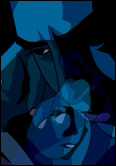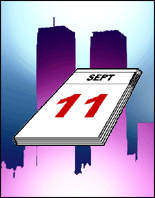The Day I Woke Up Sad
Created | Updated Dec 6, 2009

Those whose sense of logic is threatened by the following story are welcome to regard it as a species of fiction. But this is the way I remember it - and, apparently, I am not alone.
It was a little over eight years ago. I was living in the historic and (mostly) friendly city of Philadelphia, in a hundred-year-old three-storey semi-detached. Life was pretty good - both Elektra and I had jobs we enjoyed, our neighbourhood, a university district, was pleasant, we spent our free time strolling around the parks and seeing the sights...you get the picture. We weren't worried about much.
So, not long after Labor Day, I was more surprised than anything else when the 6am alarm woke me and I found that I'd been crying in my sleep. I didn't even know that you could do that, cry in your sleep – children sometimes cry themselves to sleep, I supposed I had done it when I was small, but I'd never heard of anyone waking up crying. Nonetheless, my face was wet, I was sobbing, and I had no idea why. I couldn't recall any dream. The only thing I said to myself when I woke up was, 'No.' No, what?
I felt an unfathomable sadness, as if some unforeseen, terrible, life-changing event had taken place, but I had no idea what. Even while this was running through my mind, I was shutting off the alarm. Tears or no tears, it was a working day, and I had to get going. I swung my legs out of bed and headed for the shower.
Over breakfast, I mentioned my odd awakening to Elektra, who was as puzzled as me. She asked me if I wanted to stay home, but I said no, it was a nice day, there was work to do, I didn't want to play hookey. We walked the dog, packed lunches, ran for the car. I dropped her off at 30th Street Station, as usual, and continued the five blocks to my place of work.
I stopped on the way in to get coffee from the grumpy Greek whose 'roach wagon' was parked in front of the building. I still felt depressed. The sky overhead was cloudless – it was an achingly beautiful fall day. I remember thinking that it was a shame to go inside on such a day.
I set my coffee down on the desk – it wouldn't be cool enough to drink for at least half an hour – and started up my computer. The woman at the next desk came in, cheerful as usual, and asked me how I was. I told her frankly that I didn't know what was ailing me, and we exchanged home cures for Seasonal Affective Disorder, though it was still too early in the year for that. Then I put my headphones on – we all listened to music or the radio while working in order to forestall unnecessary chatter. I started in on my first journal of the day and listened to the usual news items from National Public Radio – who was doing what in Washington, weather report, yadda yadda. I concentrated on work and shaking that feeling of depression – sorrow mingled with impending doom – that had been haunting me for almost two hours now. Typing is good for that.
As I've said, I enjoyed that job, which involved reading scholarly journals, translating their titles into English, if necessary, and indexing the footnotes for a mega-database. There was no deadline pressure – the journals were always there (until the day they weren't). I don't honestly know what journal I was working on that morning, but the subject must have been theology. I think that because I was just about to get up and walk over to Michael's desk when I heard the first news – I only bothered Michael if I needed a second opinion on Hebrew transliteration.
NPR's news is mostly pre-recorded, but they must have had a television camera somewhere in the studio. Someone broke into the normal morning flow to announce that it looked as if a light plane had struck an office building in New York City. Golly, I thought. How could even an amateur pilot have made such a mistake on a bright, sunny day? I said a silent prayer for the pilot's family, and got up.
When I mentioned this news to Michael, who was listening to a different station, he offered the update that the plane was an airliner, and that it had hit the World Trade Center. This put a different complexion on things - no sense hoping for low casualties. We wondered how such pilot error could have occurred, and I got my answer about Hebrew and went back to my cooling coffee and my journal. I still felt shaky.
I was making good time on the footnotes, and was halfway through my journal when the second plane hit. This time, NPR was on it. I tossed the rest of my coffee and sat back, stunned.
Stunned, because I had just had a precognitive flash. That flash started with one word: Terrorism. One plane crash might be pilot error or faulty equipment. Two plane crashes in the same place, that was intentional. Of course the world knows that now.
That wasn't all of it, though. The thought I had was the certainty of what would happen next: A lot of people would die today (I had no clue how many). Somebody would start a war. Americans would become suspicious and fearful. Security would become insane. The economy would be ruined. In a word, life was going to become a lot more difficult for everybody.
I am not politically clever. But I know my fellow-countrymen. Sometimes I wish I didn't.
After I'd had these thoughts, I realised: Oh, that's what this morning was about. And I put the thought away.
Oddly, as soon as the second plane hit, I calmed down, as if the adrenaline rush of an emergency had passed. After all, there was nothing I could do to help. It was the turn of the firemen, policemen, military, to find themselves in full flight-or-fight. It was the turn of a lot of very important and responsible people to make a lot of life-or-death decisions. The only thing I could do was go home with the rest of the office workers. Go home, get off the Philadelphia streets in case Al-Qaeda was after the Liberty Bell, or something, go home and stay out of the way so our firemen could tear up the road to Manhattan and help those folks out. Go home, wait for Elektra to call from the suburbs. Go home and watch the buildings burn, collapse and fall, go home and talk to relatives on the phone about how horrible it all was. Go home and thank heaven I didn't know anybody who was in New York City that day.
I was so naive I thought they'd be able to get those people off the 110th floor. I had visions of daring helicopter rescues. Was that because of too many Hollywood films? When they started jumping, I was shocked, more shocked than I had been all day. I sat there wondering which mode of death I would have chosen. I worked on the first floor of a four-storey building, and took the stairs because lifts made me nervous, but I don't mind heights. I think the fire would have been worse.
Everything I'd thought of in that moment of getting the news has now come true. I live in a different city, four jobs later, and reflect that the world really did become a different place that day.
I have told very few people about what happened the morning I woke up crying. I'm not excessively prone to precognitive flashes – they are few and far between, thank goodness, and usually involve the personal, such as the time I foresaw that taxi accident in Athens – and I certainly don't like to advertise. What for?
But that one bothers me. What if...? What if I'd known what it was that I woke up with that morning? It was 6am, Eastern Daylight Time. There was still time before boarding, I think. If I'd had specific information – whom would I have called? Who would have listened to a nutcase with no security clearance? What if...?
What if the famous psychics had known what was happening – the ones the police listen to sometimes? Could anything have been done? Looking on the internet, I find other people like me who had dreams, forebodings, but nothing solid, nothing concrete...why not? Why don't these things have subtitles, 'for emergency announcement, ring 555-1212'?
I'm dumb enough to believe in precognition – you have to, when you step into a taxi and suddenly see that same taxi run up into a traffic island, realise there's no real damage, and get in with a shrug, only to see exactly the same scenario unfold 15 minutes later on an unfamiliar street – I have to, even though I know it's stupid and annoying, and utterly useless, like my sister's knowing I had missed the school bus, so what? No great message there – maybe we're just at odds with time. I'm dumb enough to believe in precognition, but I am not dumb enough to believe in fate. There are choices.
If someone had known about the men with the box-cutters, someone could have stopped them. And saved over 3,000 lives. And prevented war.
What if...? And why not?
Whenever it turns fall again, I look up at the sky and wonder.
On 12 September, 2001, I woke up feeling sad. But then I knew why.

Fact and Fiction by Dmitri Gheorgheni Archive
